八年级英语下册 Unit 5 What were you doing when the rainstorm came Period 4导学案
英语人教版八年级下册Unit 5 What were you doing wh

was it important? do you remember this event?
keep happy keep healthy!
2 I ran to the bus stop but I still missed the bus.
3 I was waiting for the bus when it began to rain heavily. 4 I was so busy looking for the umbrella that I did not see a car coming.
Jack’s unlucky day
Yesterday was a terrible day. My alarm didn't go off so I woke up late. It was seven thirty when I woke up, and I needed to be at school by eight! I ran to the bus stop... but, I still missed the bus. It was eight thirty when I got to school. My teacher was angry and I felt bad all day. At four thirty, it was time to go home. I was waiting for the bus when... all of a sudden... it began to rain heavily It was like... a really crazy rainstorm! I thought I had an umbrella in my schoolbag, so I kept trying to look for it. I was so busy looking for the umbrella that I didn't see a car coming. And it got water all over me! I was waiting like that.. completely wet... for maybe almost an hour. Finally, the bus came and brought me home. I took a hot shower and ate some warm food. It felt so good to be home!
初中英语人教版八年级下册《Unit 5 What were you doing whe》重点知识归纳

Unit 5 What were you doing when the rainstorm came?重点知识归纳重点短语1.in/on the street 在街上2.at the bus stop在公共汽车站3.at the time of the rainstorm在下暴雨的时候4.in time of difficulty面对困难的时候5.at that time在那时6.go off 发声音7.miss the bus错过了公共汽车8.pick up(本单元)接电话9.take a hot shower洗个热水澡10.strong winds狂风11.heavy rain/snow 大雨/雪12.dark clouds乌云13.be in the area在这个区域14.make sure确保,弄明白15.make dinner做晚餐16.fall asleep/ill入睡/生病17.fall in trouble遇到麻烦18.fall in love with…爱上……19.die down逐渐变弱20.die out灭绝21.die away消失22.die of/ from…死于……23.wake up醒来24.find the neighborhood in a mess发现周转一团糟25.join somebody to do something(加入)和某人一起做……26.take the car to the car wash把车开到洗车场27.the place of the accident事故发生地28.by the side of …在……边上29.get to the bus stop到达汽车站30.make one’s way to somewhere往……去。
前进。
31.be helpful to do something做……有帮助32.the news of important events in history历史上的重要事件的新闻33.the news on the radio/ TV收音机/电视的新闻34.be completely shocked被彻底震惊35.in silence静静地36.in surprise 吃惊地37.in joy 高兴地38.the rest of …其余的……;剩下的……39.the World Trade Center世贸中心40.be taken down by terrorists被恐怖分子摧毁41.have meaning to somebody对某人有特别的意义42. a day Kate Smith will never forget 凯特Smith永远不会忘记的一天43.remember doing something记得做过了……44.look out the window看窗外45.have trouble/ difficulty /problem (in) doing something做……有麻烦/困难/问题46.there is trouble /difficulty / problem (in) doing something做……有麻烦/困难/问题47.point out指出48.the big day一个重要的日子49.sat still and listened50.played the song without any mistakes毫不出错地演奏了这首歌51.call out the winner大声喊出胜者52.the happiest day of my life我生命中最高兴的一天53.so far到目前为止54.get wet打湿55.be caught in the rain被阻于雨中56.be caught under a big stone被压于大石下57.all of sudden突然58.be busy doing something忙于做……59.be busy with something忙于做……60.leave somebody / something somewhere把某人/某物留在某地61.run back home跑回家62.the Animal Helpline动物求助热63.walk by路过64.cheer somebody on给某人加油/打气重点句型1. — What were you doing at eight last night?昨晚8 点你在干什么?— I was taking a shower.我在洗淋浴。
洛阳市八年级英语下册Unit5Whatwereyoudoingwhentherainstormcam

洛阳市八年级英语下册Unit5Whatwereyoudoingwhentherainstormcame必须掌握的典型题单选题1、I _____________ a math problem with Joe when Mike called me up.A.have discussedB.discussedC.was discussing答案:C句意:Mike打电话给我时,我正在与Joe讨论一道数学难题。
考查时态。
have discussed 现在完成时态;discussed 一般过去时态;was discussing 过去进行时。
根据called可知事情发生在过去,此处是when引导的时间状语从句,“讨论”这个动作可以持续进行,故应用过去进行时,结构为was/were doing.故选C。
2、When he came in, I ________ my sister ________ cooking.A.was helping;withB.helped;withC.helped;atD.was helping;at答案:A句意:当他进来的时候,我正在帮我妹妹做饭。
考查动词时态及固定短语。
help帮助;was helping过去进行时;helped过去式;with和……在一起,具有;at 在; when引导的时间状语从句,可兼指“时间点”与“时间段”。
“进来”是一时的动作,而且发生在“我帮助妹妹做饭”的过程中,所以从句用一般过去时,主句用过去进行时。
help sb. with sth.帮助某人做某事,固定短语。
故选A。
3、— I didn’t see you at the beginning of the party last night.— I _________ on my biology report at that time.A.workedB.workC.was workingD.am working答案:C试题分析:句意:—昨晚在聚会的开始我没有见到你。
初中英语人教版八年级下册Unit 5 What were you doing whe
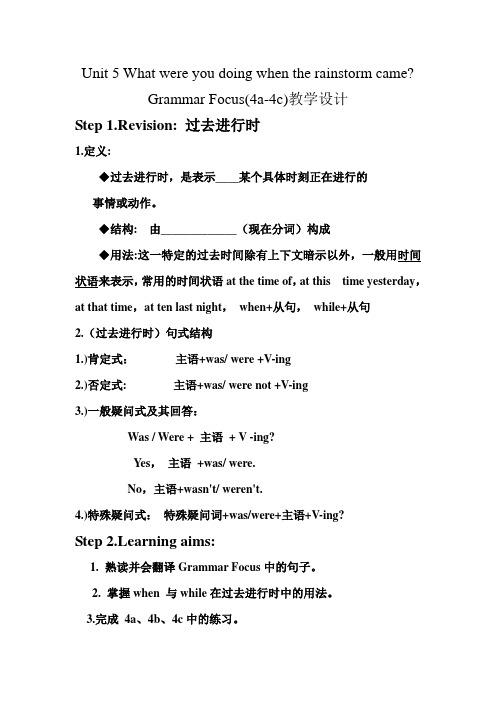
Unit 5 What were you doing when the rainstorm came?Grammar Focus(4a-4c)教学设计Step 1.Revision: 过去进行时1.定义:◆过去进行时,是表示____某个具体时刻正在进行的事情或动作。
◆结构: 由_____________(现在分词)构成◆用法:这一特定的过去时间除有上下文暗示以外,一般用时间状语来表示,常用的时间状语at the time of,at this time yesterday,at that time,at ten last night,when+从句,while+从句2.(过去进行时)句式结构1.)肯定式:主语+was/ were +V-ing2.)否定式: 主语+was/ were not +V-ing3.)一般疑问式及其回答:Was / Were + 主语+ V -ing?Yes,主语+was/ were.No,主语+wasn't/ weren't.4.)特殊疑问式:特殊疑问词+was/were+主语+V-ing?Step 2.Learning aims:1.熟读并会翻译Grammar Focus中的句子。
2. 掌握when 与while在过去进行时中的用法。
3.完成4a、4b、4c中的练习。
Step 3.Self-study自主学习提纲:Task1. Read the sentences in Grammar Focus and translate them. Task2. 在Grammar Focus中划出when 与while引导的时间状语从句中的动词,判断这些动词是延续性动词还是非延续性动词并注意时态。
Task3. 仿4a中的例句,用while 与when造句(判断动词是延续性动词还是非延续性动词并注意时态)。
Task4. 完成导学案第二题“when和while的区别”。
人教版八年级下册Unit 5 What were you doing when课件(共19张PPT)
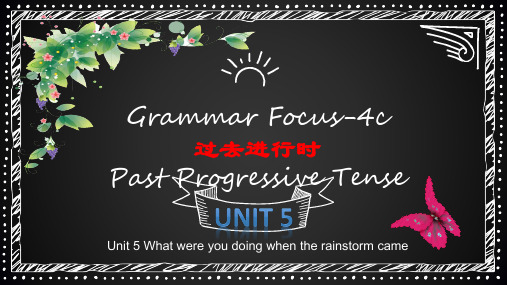
例3: She was writing a letter when I came in.
我进来时,她正在写信。
②表示在过去
某一时间内正 在进行的动作。
例4 The barber was cutting my hair when they arrived.
他们到达时,理发师正在给我剪头发。
Oral Practice
3
4
表示思维或心理状态的动词:
believe (认为), forget, consider, 表示所属关系的动词:
know, remember, hope, wish, want 等
belong, have, own, hold (容纳) 等
用
所 给
• 1. We w_e_r_e_w__a_s_h_in_g_ (wash) our clothes at six yesterday evening.
Pairwork:
• Patterns: • A: What were you doing at nine o’clock last Sunday morning? • B: I was sleeping. How about you? • A: I was doing my homework. • B: You are kidding
1.when 既指时间 点,也可指一段 时间;
while只指一段时 间.
1.My mother was cooking dinner while my father was watching TV. 2.When the UFO landed,
the boy was walking down the street.
2.公式:
初中英语人教版八年级下册Unit 5 What were you doing wh
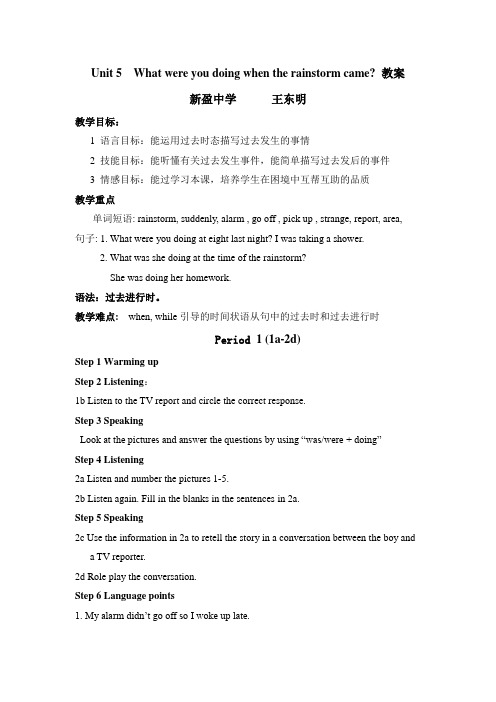
Unit 5 What were you doing when the rainstorm came? 教案新盈中学王东明教学目标:1 语言目标:能运用过去时态描写过去发生的事情2 技能目标:能听懂有关过去发生事件,能简单描写过去发后的事件3 情感目标:能过学习本课,培养学生在困境中互帮互助的品质教学重点单词短语: rainstorm, suddenly, alarm , go off , pick up , strange, report, area,句子:1. What were you doing at eight last night? I was taking a shower.2. What was she doing at the time of the rainstorm?She was doing her homework.语法:过去进行时。
教学难点:when, while引导的时间状语从句中的过去时和过去进行时Period 1 (1a-2d)Step 1 Warming upStep 2 Listening:1b Listen to the TV report and circle the correct response.Step 3 SpeakingLook at the pictures and answer the questions by using “was/were + doing”Step 4 Listening2a Listen and number the pictures 1-5.2b Listen again. Fill in the blanks in the sentences in 2a.Step 5 Speaking2c Use the information in 2a to retell the story in a conversation between the boy anda TV reporter.2d Role play the conversation.Step 6 Language points1. My alarm didn’t go off so I woke up late.alarm n. 闹钟e.g. What time shall I set the alarm for?我该把闹钟拨到几点钟响?2. I was waiting for the bus when it began to rain heavily.1) begin v. (began) 开始e.g. I’ll begin whenever you’re ready.你什么时候准备好我就开始。
英语人教版八年级下册Unit 5 What were you doing wh
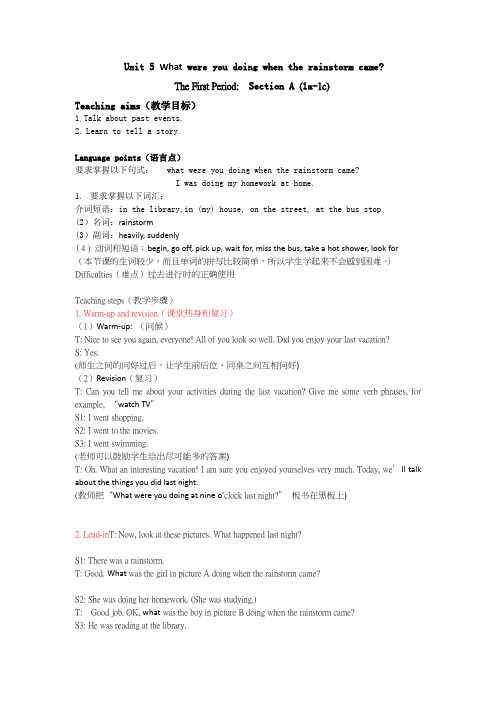
Unit 5 What were you doing when the rainstorm came?The First Period: Section A (1a-1c)Teaching aims(教学目标)1. Talk about past events.2.Learn to tell a story.Language points(语言点)要求掌握以下句式: what were you doing when the rainstorm came?I was doing my homework at home.1.要求掌握以下词汇:介词短语:in the library,in (my) house, on the street, at the bus stop(2)名词:rainstorm(3)副词:heavily, suddenly(4 ) 动词和短语:begin, go off, pick up, wait for, miss the bus, take a hot shower, look for(本节课的生词较少,而且单词的拼写比较简单,所以学生学起来不会感到困难。
)Difficulties(难点)过去进行时的正确使用Teaching steps(教学步骤)1. Warm-up and revision(课堂热身和复习)(1)Warm-up: (问候)T: Nice to see you again, everyone! All of you look so well. Did you enjoy your last vacation?S: Yes.(师生之间的问好过后,让学生前后位、同桌之间互相问好)(2)Revision(复习)T: Can you tell me about your activities during the last vacation? Give me some verb phrases, for example, “watch TV”S1: I went shopping.S2: I went to the movies.S3: I went swimming.(老师可以鼓励学生给出尽可能多的答案)T: Oh. What an interesting vacation! I am sure you enjoyed yourselves very much. Today, we’ll talk about the things you did last night.(教师把“What were you doing at nine o’clock last night?”板书在黑板上)2. Lead-in T: Now, look at these pictures. What happened last night?S1: There was a rainstorm.T: Good. What was the girl in picture A doing when the rainstorm came?S2: She was doing her homework. (She was studying.)T: Good job. OK, what was the boy in picture B doing when the rainstorm came?S3: He was reading at the library.T: Good. What was the woman doing in picture C when the rainstorm came?S4: She was waiting for the bus.T: That’s correct. What was the man doing in picture D when the rainstorm came?S5: He was walking home from the supermarket.3. Read and match (Work on 1a)T: OK, great. Let’s look at the se four sentences. Can you match each sentence to the correct picture? 用课件4. Listening (Work on 1b)T: Now you’ll hear a conversation. Listen carefully and write the correct letters from the picture above on the lines below.(教师放录音,因为对话简单教师可以在放完一遍录音以后就订正答案)T: Listen again and try to catch the adverb like “often”、“usually”in each sentence.(教师可以把含有频率副词的句子写在黑板上,然后反复领读这几个句子,句中的副词可以用彩笔标注)T: Can you guess the meaning of the words in color?(可以让学生讨论之后给出答案,然后教师再给出准确的讲解.图解之后,教师应该强调频率副词的使用位置:be 动词之后,行为动词之前)教学设计说明:5. Work on 1cT: Look at 1c. I want one student to read the conversation for us.T: Look at the picture in 1a. Ask and answer questions in pairs, “What does she do on weekends?”(给学生练习的时间)Now retell the story in your own words.教学设计说明:6. Work on 2a and 2bT: Listen and number the pictures [1-5].T: Then, listen again. Now fill in the blanks in the sentences in 2a.Have Ss get into pairs and check their answers.7. Work on 2cT: Look at the information in 2a again. Then get into pairs. Student A will be the boy and Student B, a TV reporter.T: Use the information in 2a to retell the story in a conversation between the boy and a TV reporter. Have Ss practice their conversations. Then, have some pairs present their conversations to the class.8. Work on 2dHave Ss get into pairs again and role-play the conversation.Then get them to look at the screen and answer the questions.9. Make a surveyT: Let’s make a survey on “What does your friend do on weekends?”Work in four groups. One of the students should write down the results.14(让学生四人一组作调查,其中一名同学负责记录)T: Who would like to give us an example?S1: Jim often watches TV.Lucy always goes shopping.Li lLi never goes to movies.………………….10. HomeworkOral:Read aloud the new words learned in this lesson.Written:Make a survey about your parents’activities in their free time.。
初中英语人教版八年级下册Unit 5 What were you doing whe

1. Read the article and try to retell it in your own words.
2.Exercise book 2
Brief summary
4) When Ben _______________at 3:00 a.m., the wind _________________.
Step 4 Groupwork
1.First get the students to discuss part of speech of each word in3cand check.
Step 2 Fast reading
1.What was the weather like before the heavy ran started?
2.What was the neighborhood like after the storm?
Step 3 Careful reading
Read the passage again and complete the sentences using information .
2) Give Ss practice in reading for specific information
3) Give Ss practice in using while and when
Key points
1)Words and expressions:make sure,work,With no light outside, it felt like midnight.
Language points
Withsure,It isadj.+ to do sth,fall asleep
初中英语人教版八年级下册Unit 5 What were you doing whe
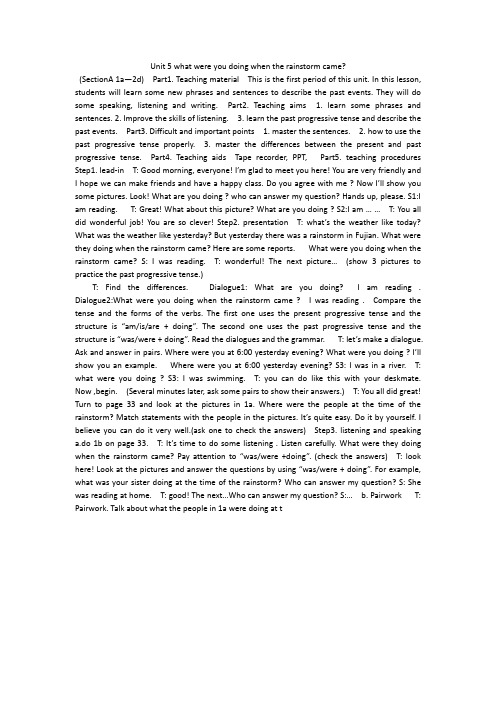
Unit 5 what were you doing when the rainstorm came?(SectionA 1a—2d) Part1. Teaching material This is the first period of this unit. In this lesson, students will learn some new phrases and sentences to describe the past events. They will do some speaking, listening and writing. Part2. Teaching aims 1. learn some phrases and sentences. 2. Improve the skills of listening. 3. learn the past progressive tense and describe the past events. Part3. Difficult and important points 1. master the sentences. 2. how to use the past progressive tense properly. 3. master the differences between the present and past progressive tense. Part4. Teaching aids Tape recorder, PPT, Part5. teaching procedures Step1. lead-in T: Good morning, everyone! I’m glad to meet you here! You are very friendly and I hope we can make friends and have a happy class. Do you agre e with me ? Now I’ll show you some pictures. Look! What are you doing ? who can answer my question? Hands up, please. S1:I am reading. T: Great! What about this picture? What are you doing ? S2:I am … … T: You all did wonderful job! You are so clever! S tep2. presentation T: what’s the weather like today? What was the weather like yesterday? But yesterday there was a rainstorm in Fujian. What were they doing when the rainstorm came? Here are some reports. What were you doing when the rainstorm came? S: I was reading. T: wonderful! The next picture… (show 3 pictures to practice the past progressive tense.)T: Find the differences. Dialogue1: What are you doing? I am reading . Dialogue2:What were you doing when the rainstorm came ? I was reading . Compare the tense and the forms of the verbs. The first one uses the present progressive tense and the structure is “am/is/are + doing”. The second one uses the past progressive tense and the structure is “was/were + doing”. Read the dialogues and the grammar. T: let’s make a dialogue. Ask and answer in pairs. Where were you at 6:00 yesterday evening? What were you doing ? I’ll show you an example. Where were you at 6:00 yesterday evening? S3: I was in a river. T: what were you doing ? S3: I was swimming. T: you can do like this with your deskmate. Now ,begin. (Several minutes later, ask some pairs to show their answers.) T: You all did great! Turn to page 33 and look at the pictures in 1a. Where were the people at the time of the rainstorm? Ma tch statements with the people in the pictures. It’s quite easy. Do it by yourself. I believe you can do it very well.(ask one to check the answers) Step3. listening and speaking a.do 1b on page 33. T: It’s time to do some listening . Listen carefully. W hat were they doing when the rainstorm came? Pay attention to “was/were +doing”. (check the answers) T: look here! Look at the pictures and answer the questions by using “was/were + doing”. For example, what was your sister doing at the time of the rainstorm? Who can answer my question? S: She was reading at home. T: good! The next…Who can answer my question? S:… b. Pairwork T: Pairwork. Talk about what the people in 1a were doing at t。
初中英语人教版八年级下册Unit 5 What were you doing whe

Unit 5What were you doing when the rainstorm came?The First PeriodSection A (1a2d)I.Teaching aims1.Key words:alarm,begin,heavily,suddenly,strange2.Key phrases:at the time of…,wait for,on the street,at the bus stop,go off,take a shower,miss the bus,pick up,so many times,at that time3.Important sentences:①What were you doing when the rainstorm came?②What was the girl doing at the time of the rainstorm?③What were you doing last night,Linda?④I called at seven and you didn't pick up.⑤While you were sleeping,I called Jenny and she helped me.II.Important points:1.重点短语和句型2.过去进行时态的用法3.when和while的用法III.Difficult points:1.过去进行时态的用法2.when和while的用法IV.Teaching processStep 1 Lead inThe teacher points at a girl in the classroom and asks:Teacher:Where are you?Student 1:I am in the classroom...Teacher:What are you doing?Student 1:I am answering your questions.The teacher writes “What are you doing?”on the blackboard and asks in Chinese:这是什么时态?引导学生回答,复习现在进行时态的意义及结构。
英语人教版八年级下册Unit 5 What were you doing wh

或某一时间段正在 进行的动作。
结构: was/were + doing
We are having an English class.
eg:
We were having an class at this time yesterday.
过去进行时的时间状语:
表示过去的某个时间点:
at this/that time yesterday at four o’clock yesterday afternoon
1b Listen to the TV report and circle
the correct responses. a. doing my homework / studying b. playing basketball / reading c. going to work / waiting for the bus d. walking home / shopping
1. __ b I was in the library. a I was in my house. 2. __ d I was on the street. 3. __ c I was at the bus stop. 4. __
What were they doing when the rainstorm came? Let’s listen. Pay attention to “was/were +doing”.
1c Talk about what the people in 1a were doing at the time of the rainstorm.
A: What was the girl doing at the time of the rainstorm? B: She was…
(完整版)八年级英语下册Unit5知识点总结Unit5Whatwereyoudoingwhentherainstormcame
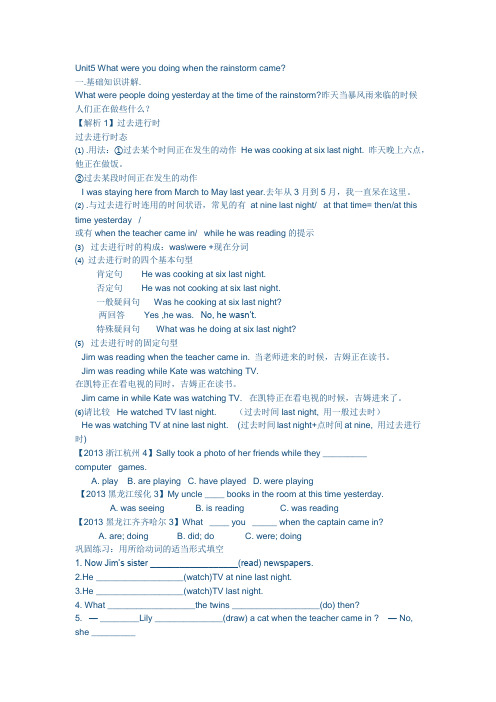
Unit5 What were you doing when the rainstorm came?一.基础知识讲解.What were people doing yesterday at the time of the rainstorm?昨天当暴风雨来临的时候人们正在做些什么?【解析1】过去进行时过去进行时态⑴ .用法:①过去某个时间正在发生的动作He was cooking at six last night. 昨天晚上六点,他正在做饭。
②过去某段时间正在发生的动作I was staying here from March to May last year.去年从3月到5月,我一直呆在这里。
⑵ .与过去进行时连用的时间状语,常见的有at nine last night/ at that time= then/at this time yesterday /或有when the teacher came in/ while he was reading的提示⑶过去进行时的构成:was\were +现在分词⑷过去进行时的四个基本句型肯定句He was cooking at six last night.否定句He was not cooking at six last night.一般疑问句Was he cooking at six last night?两回答Yes ,he was. No, he wasn’t.特殊疑问句What was he doing at six last night?⑸过去进行时的固定句型Jim was reading when the teacher came in. 当老师进来的时候,吉姆正在读书。
Jim was reading while Kate was watching TV.在凯特正在看电视的同时,吉姆正在读书。
Jim came in while Kate was watching TV. 在凯特正在看电视的时候,吉姆进来了。
八年级英语下册Unit-5知识点总结Unit5-What-were-you-doing-when-the-rainstorm-came
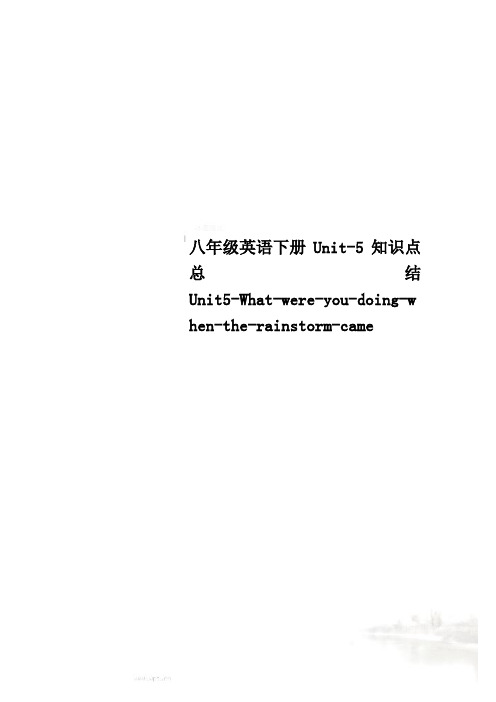
八年级英语下册Unit-5知识点总结Unit5-What-were-you-doing-w hen-the-rainstorm-cameUnit5 What were you doing when the rainstorm came?一.基础知识讲解.What were people doing yesterday at the time of the rainstorm?昨天当暴风雨来临的时候人们正在做些什么?【解析1】过去进行时过去进行时态⑴ .用法:①过去某个时间正在发生的动作He was cooking at six last night. 昨天晚上六点,他正在做饭。
②过去某段时间正在发生的动作I was staying here from March to May last year.去年从3月到5月,我一直呆在这里。
⑵ .与过去进行时连用的时间状语,常见的有at nine last night/ at that time= then/at this time yesterday /或有when the teacher came in/ while he was reading的提示⑶过去进行时的构成:was\were +现在分词⑷过去进行时的四个基本句型肯定句He was cooking at six lastnight.否定句He was not cooking at six last night.一般疑问句Was he cooking at six last night?两回答Yes ,he was. No, he wasn’t.特殊疑问句What was he doing at six last night?⑸过去进行时的固定句型Jim was reading when the teacher came in. 当老师进来的时候,吉姆正在读书。
Jim was reading while Kate was watching TV.在凯特正在看电视的同时,吉姆正在读书。
初中英语人教版八年级下册unit5 what were you doing
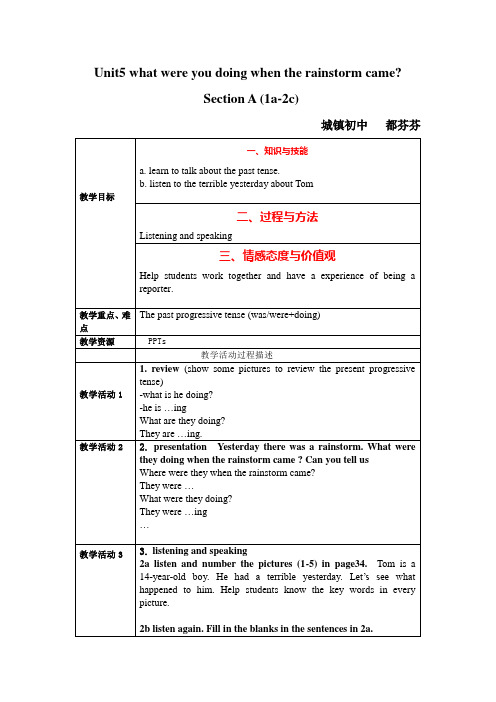
教后反思
教学活动2
2.presentationYesterday there was a rainstorm. What were they doing when the rainstorm came ? Can you tell us
Where were they when the rainstorm came?
2b listen again. Fill in the blanks in the sentences in 2a.
2c speaking practice
Use the information in 2a to retell the story in a conversation between the boy and a TV reporter.
They were …
What were they doing?
They were …ing
…
教学活动3
3.listening and speaking
2a listen and number the pictures (1-5) in page34.Tom is a 14-year-old boy. He had a terrible yesterday. Let’s see what happened to him. Help students know the key words in every picture.
Tom: I ___________ and___________
4 summury
The past progressive tense
5 groupwork
What were they doing when you saw them?
初中英语人教版八年级下册Unit5 What were you doing
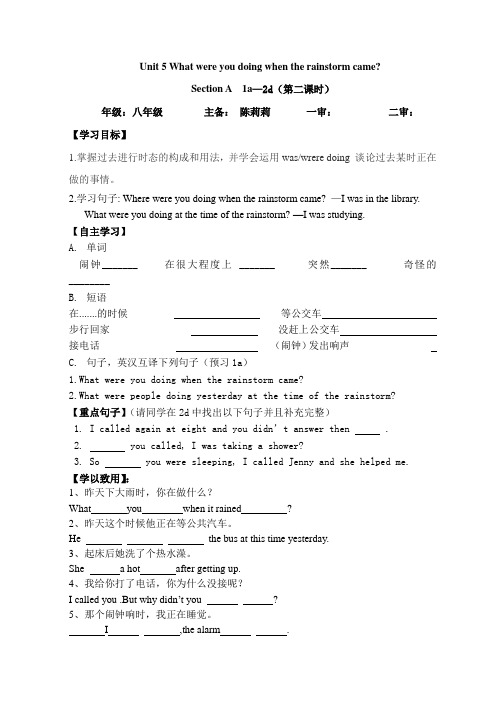
Unit 5 What were you doing when the rainstorm came?Section A 1a—2d(第二课时)年级:八年级主备:陈莉莉一审:二审:【学习目标】1.掌握过去进行时态的构成和用法,并学会运用was/wrere doing 谈论过去某时正在做的事情。
2.学习句子: Where were you doing when the rainstorm came? —I was in the library.What were you doing at the time of the rainstorm? —I was studying.【自主学习】A.单词闹钟_______ 在很大程度上 _______ 突然_______ 奇怪的________B.短语在.......的时候______________ 等公交车步行回家_________________ 没赶上公交车接电话________________ (闹钟)发出响声________________C.句子,英汉互译下列句子(预习1a)1.What were you doing when the rainstorm came?2.What were people doing yesterday at the time of the rainstorm?【重点句子】(请同学在2d中找出以下句子并且补充完整)1. I called again at eight and you didn’t answer then .2. you called, I was taking a shower?3. So you were sleeping, I called Jenny and she helped me.【学以致用】:1、昨天下大雨时,你在做什么?What you when it rained ?2、昨天这个时候他正在等公共汽车。
八年级英语下册 Unit 5 What were you doing when the rainst

flashlights and radio were working. She also put some candles and matches on the table. Ben was helping his mom make dinner when the rain began to beat heavily against the windows. After dinner, they tried to play a card game, but it was hard to have fun with a serious storm happening outside.
3
I _w__a_s_w_a_i_t_in_g_ for the bus when it began to rain heavily.
4
I _w__a_s_ so busy l_o_o_k_i_n_g for the umbrella that I didn’t see a car coming.
TV reporter: Tell us what happened yesterday morning.
Boy: … TV reporter: So, when the rainstorm suddenly
came, what were you doing? Boy: …
2d. Role-role the conversation.
5
I took a hot shower and ___a_te_______ some warm food.
初中英语人教版八年级下册Unit 5 What were you doing whe
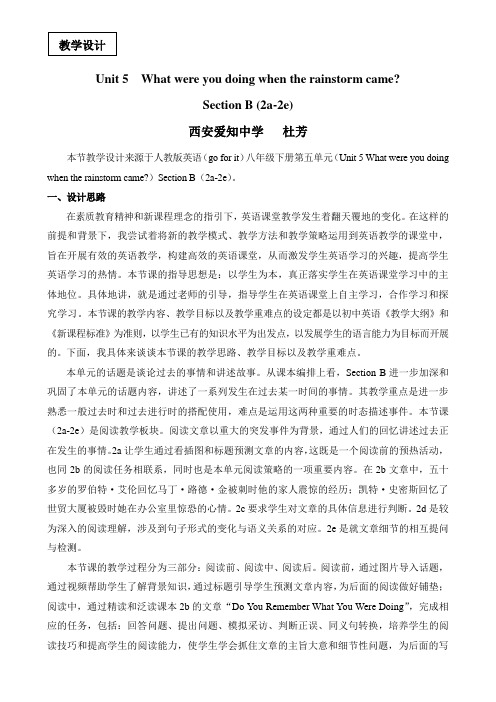
Unit 5 What were you doing when the rainstorm came?Section B (2a-2e)西安爱知中学杜芳本节教学设计来源于人教版英语(go for it)八年级下册第五单元(Unit 5 What were you doing when the rainstorm came?)Section B(2a-2e)。
一、设计思路在素质教育精神和新课程理念的指引下,英语课堂教学发生着翻天覆地的变化。
在这样的前提和背景下,我尝试着将新的教学模式、教学方法和教学策略运用到英语教学的课堂中,旨在开展有效的英语教学,构建高效的英语课堂,从而激发学生英语学习的兴趣,提高学生英语学习的热情。
本节课的指导思想是:以学生为本,真正落实学生在英语课堂学习中的主体地位。
具体地讲,就是通过老师的引导,指导学生在英语课堂上自主学习,合作学习和探究学习。
本节课的教学内容、教学目标以及教学重难点的设定都是以初中英语《教学大纲》和《新课程标准》为准则,以学生已有的知识水平为出发点,以发展学生的语言能力为目标而开展的。
下面,我具体来谈谈本节课的教学思路、教学目标以及教学重难点。
本单元的话题是谈论过去的事情和讲述故事。
从课本编排上看,Section B进一步加深和巩固了本单元的话题内容,讲述了一系列发生在过去某一时间的事情。
其教学重点是进一步熟悉一般过去时和过去进行时的搭配使用,难点是运用这两种重要的时态描述事件。
本节课(2a-2e)是阅读教学板块。
阅读文章以重大的突发事件为背景,通过人们的回忆讲述过去正在发生的事情。
2a让学生通过看插图和标题预测文章的内容,这既是一个阅读前的预热活动,也同2b的阅读任务相联系,同时也是本单元阅读策略的一项重要内容。
在2b文章中,五十多岁的罗伯特·艾伦回忆马丁·路德·金被刺时他的家人震惊的经历;凯特·史密斯回忆了世贸大厦被毁时她在办公室里惊恐的心情。
- 1、下载文档前请自行甄别文档内容的完整性,平台不提供额外的编辑、内容补充、找答案等附加服务。
- 2、"仅部分预览"的文档,不可在线预览部分如存在完整性等问题,可反馈申请退款(可完整预览的文档不适用该条件!)。
- 3、如文档侵犯您的权益,请联系客服反馈,我们会尽快为您处理(人工客服工作时间:9:00-18:30)。
Unit5 What were you doing when the
rainstorm came?
Period4 SectionB2a-selfcheck
【学习目标】
知识与技能
(1)熟练掌握下列词汇:
passage、pupil、completely、silence、recently、date、tower、
truth
(2)熟练掌握下列短语:
in silence、take down、at first、point out、as well、call out
(3)掌握下列句型:
①On this day ,Dr. martin Luther King was killed .
②More recently ,most Americans remember what they were doing when the W Trade Center in New York was taken down by terrorists .
③She remembers working in her office near the two towers .
④I didn’t believe him at first , but then I looked out the window and was true .
⑤I was so scared that I could hardly think clearly after that .
⑥Kate didn’t think her friend was telling the truth about the event .
⑦But when I pointed it out to my friend ,it went away .
⑧While my brother was laughing ,the television news reported that other
⑨Then I waited for them to call out the winner .
过程与方法
阅读理解与练习,写作练习,
情感、态度与价值观
通过本课学习,培养学生崇尚自由民主、热爱和平的意识。
享受成功的
喜悦,
让自己拥有难忘的美好记忆
【教学重难点】
重点:
阅读策略及写作训练。
看标题和文章的首句来判断文章的大意。
难点:
阅读策略及写作训练。
【导学过程】
一.新课预习
通过预习,试译词组:
1. 重要事件_____________
2. 在历史上____________
3. 50多__________________
4. 被杀害_______________
5.被完全震到______________
6. 剩下的晚餐________________
7. 默默的____________ 8. 拆除,摧毁
__________________
9. 记得做过某事_______________ 10. 说实话_________________
11. 对某人很重要_______________ 12. 在思考方面有问题
________________
二. 情景导入
看文章的标题和图片,你能猜出它是关于什么事件以及它的大意吗?
三.合作探究
1: 仔细阅读短文完成下列汉译英
(1)人们经常记得当他们听到历史上重要事件的新闻时他们正在做什
么。
(2)这是美国历史上一次重大事件。
(3)当我们从广播中听到这个新闻时,我们正在厨房里吃晚饭。
2: 速读 (Fast Reading)
Read the passage quickly and find the answers to the questions: (1) What 3: 精读 (Intensive Reading)
Read the passage carefully and finish 2c ,2dcand 2e.
4: Writing. Finish 3a and 3b
5.selfcheck
四.点拨总结
1. passage n. 章节,段落
passage 作“(文章的)段落”解时, 不限于文章的一个自然段, 也
可以由若干句话或若干个 paragraphs 组成。
passage 也可作“一段, 一节”解, 一般指讲话、文章或乐曲的一
部
分。
e.g. The teacher spent an hour in explaining this passage.
老师用了一小时来讲解这一段。
Choose the correct order of the following sentences to form a passage. 下列句子排好顺序组成一篇短文。
2. My parents were completely shocked!
completely adv. 彻底地,完全地
e.g. I understand completely. 我完全明
白。
shocked adj. 惊愕的;受震惊的
e.g. She was so shocked that she could hardly say a word.
她大为震惊,几乎一句话也说不出来。
[即学即练] 翻译下列句子。
1) 看到邻居那样对待孩子我很惊愕。
2) 他对她抽烟感到很震惊。
3. My parents did not talk after that, and we finished the rest of our d 默,无声 without speaking or making a sound; silently
e.g. Many patients were waiting in silence.
许多病人在静静地等候着。
A hundred and fifty reporters sat in silence.
在场的150名记者静静地坐在那里。
4. I didn’t believe him at first.
at first “起初,首先”,作为介词短语,只起副词作用(在句中
用作状语)。
at first主要用于强调前后对照,暗示接下去的动作与
前面的动作不同甚至相反,因此常
有 but, afterwards, soon, at last 等相呼应。
e.g. At first we used hand tools. 首先我们使用手工工具。
At first I didn’t want to go, but soon I changed my mind. 我
开始不想去,但我很快就改变了主意。
☆过去进行时
1. 概念: 表示过去某个时刻或过去一段时间正在进行的动作。
2. 句子结构: 主语 + was/were + doing sth. + 时间状语
3. 时间状语词: at 5:00 yesterday afternoon, at that time, then
等连用, 或者用另一动作来表示过去的时间。
如:
They were playing basketball when she arrived.
While they were playing basketball, she arrived.
过去进行时与一般过去时的区别
过去进行时着重描述当时正在持续进行的动作,它的特点是:暂时,持
续和未完成,强调过程;一般过去时表示发生过的动作或存在的状态,
即表示动作发生过,而且已经结束了,强调结果。
五.训练评价
用所给词的适当形式填空。
1. To tell the __________(true), I don’t think you are right.
2. They finished their work in _________ (silent).
3. I have problems ___________(do) my homework.
4. I ________(意识到)
I was lost in the forest. 5. She likes every p_____ in her class. 用所给动词的正确形式填空。
1. —What_____ you_____(do) when he arrived? —
I ___________(watch) TV at that time.
2. When I___________ (walk) in the street, I__________ (meet) my
4. While my parents were doing some cleaning, my sister_________ (shout) loudly.
5. When he saw the thief steeling things in the office, he closed the do
6. I first met my girl friend two years ago, she__________ (work) in the 8. What________ your parents_________ (do) at nine o’clock last night?
六.学习反思
开心 ,我学会了:
1.
2.
3.
加油 ,这些我还不懂:
1.
2.
3.。
